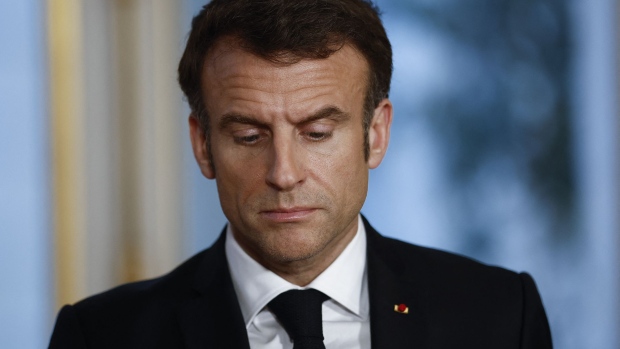Mar 25, 2023
France’s Macron Loses Voters to Le Pen’s Far Right in Ifop Poll
, Bloomberg News

(Bloomberg) -- Marine Le Pen’s far-right party is the biggest beneficiary of French discontent over President Emmanuel Macron’s decision to push through an increase in the retirement age, according to a survey by pollster Ifop for Le Journal du Dimanche newspaper.
If legislative elections were to take place on Sunday, 26% of the 1,094 adults interviewed via the Internet March 20-21 said they would support National Rally candidates. That was 5 points higher than the previous poll in November, before a series of strikes and protests against the unpopular pension overhaul.
A group of parties that back Macron would get the votes of 22% of those polled, down 5 points. Politicians from the Nupes alliance of left-wing and green parties would get 26%, up just 1 point from November despite their strong mobilization against Macron’s reform.
“The major lesson is that the National Rally is in the lead; it’s unheard of,” Ifop head Frederic Dabi told the JDD. “It has a catch-all electoral platform. There are hardly any categories any more where it’s very weak, except among senior executives, where it only reaps 13%.”
Read more: Macron Pension Gambit Sparks Revolt, Pushes France to the Brink
Millions of people have joined nationwide strikes and marches since mid-January against the pension reform, which includes raising the retirement age by two years to 64. Macron has stood firm and insisted again last week that the changes are necessary in order to preserve the system and protect public finances.
What Bloomberg Economics Says...
“Opposition to the reform is widespread and strikes in refineries, transports and garbage collection are adding to the risks of disruption. Surveys suggest the economy is holding up well so far and may even manage to expand slightly in the first quarter. But as social tensions persist, adding to the tightening of monetary conditions and heightened financial uncertainty, risks for the rest of 2023 appear increasingly tilted to the downside.”
—Maeva Cousin, economist. For full analysts, click here
Protests escalated after the bill was forced through using Article 49.3 of the French constitution to bypass a National Assembly vote, when it became clear the government, which lost its absolute majority in elections last June, didn’t have the support it was banking on from conservative Republican lawmakers.
Scuffles with riot police have broken out in major cities, often leading to the use of tear gas and water cannons to disperse crowds. With garbage collectors on strike, thousands of tons of trash have piled up on the streets of Paris, and a number of bins have been set on fire.
Dozens of people were injured in clashes between security forces and demonstrators in western France on Saturday during an unauthorized protest against the construction of large water reservoirs destined for the agriculture industry. Interior Minister Gerald Darmanin spoke of extreme violence by the ultra left and far left.
Government spokesman Olivier Veran acknowledged in an interview with the JDD that protesters are angry, and said their voices must be heard.
“While many are demonstrating against the pension reform, others are also doing it for their purchasing power or because they struggle to access public services,” he was quoted as saying. French inflation accelerated to a euro-era record of 7.2% in February, driven by food and services costs.
Labor unions have called a fresh day of nationwide strikes and protest marches on Tuesday.
The strongest support for Le Pen outside her own party faithful was among voters with no political affiliation, with almost one-third saying they’d back a National Rally candidate, according to Ifop.
Meanwhile, younger voters have turned toward Nupes and to a lesser extent the far right, the poll showed. Only 12% of those age below 35 said they would pick candidates from Macron’s group — the Renaissance, Modem and Horizons parties — compared with 31% of those age 65 and over.
Veran said more reforms will follow, some of which, like the pension plan, will be unpopular and that young people were particularly against the use of Article 49.3. This led to no-confidence votes in parliament last Monday, one of which almost brought down the government of Prime Minister Elisabeth Borne.
“For them, it just feeds distrust in our institutions and those who represent them in general,” he said.
Open to Talks
Borne told Agence France-Presse in an interview on Sunday she aims to avoid using Article 49.3 again for anything other than budget bills. She also said she would meet opposition leaders early next month and was open to talks with unions. Le Pen and Nupes’s Jean-Luc Melenchon have called for Borne to resign.
In the first round of France’s legislative elections in June, Macron’s group had 26.9% support, ahead of Nupes with 26.3% and National Rally with 19.2%. The margin of error in the Ifop poll was around 2.5-2.8 points.
The next presidential and legislative elections are due in 2027. Before that there will be European votes next year and municipal elections in 2026.
(Updates with Borne comments in 16th paragraph and election timetable in 18th paragraph.)
©2023 Bloomberg L.P.






